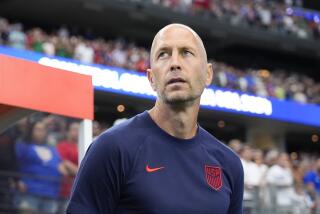Column: Eric Wynalda’s controversial reputation kept him from rising in soccer’s ranks. Now being an outsider might take him all the way to the top.
Eric Wynalda was worried.
“How close are we?” he asked.
We lost track of time while talking about the state of soccer in this country over a Denny’s breakfast. Now, his 8-year-old son’s soccer game was about to start and we had to return to the field, which was in a part of Long Beach that was unfamiliar to both of us.
“My wife is going to be so pissed,” Wynalda said.
My phone vibrated. It was a text message from his unofficial press coordinator: his wife.
“Tell her we’re two minutes away,” he said.
At this stage of his life, the 48-year-old Wynalda treasures peace and calm, which is why the former U.S. national team striker is perplexed by his inability to shake his reputation as a volatile personality.
Soccer has flourished as a business in this country over the past decade and a half, with Major League Soccer more than doubling its number of teams and the United States Soccer Federation sitting on a surplus reportedly in excess of $130 million. The game has become financially stable. What still requires development is the soccer itself, which makes this the right time for the sport to come under the leadership of a soccer person such as Wynalda, as opposed to a businessman in the mold of departing federation president Sunil Gulati.
But Wynalda remains a pariah in the eyes of the sport’s ever-incestuous establishment.
It was the spectacular failure of that establishment to return the U.S. men’s national team to the World Cup that created an unexpected opening for Wynalda’s bid to take over the national federation. A new president will be elected next month and Wynalda has surprisingly emerged as one of the favorites, as the prophetic nature of his long-ignored warnings has transformed many skeptics into believers and earned him the backing of the segment of the electorate questioning the existing power structure.
The former leading scorer of the men’s national team, Wynalda has the highest profile of the top candidates. But if his storied playing career is his strongest selling point, it’s also been his greatest liability.
Wynalda the player was as temperamental as he was gifted. The Westlake High graduate was the first American to play in Germany’s top division and scored the first goal in MLS history, but also is remembered for being ejected from his first World Cup game for throwing an elbow at an opponent’s head. He was outspoken, too, resulting in numerous conflicts with coaches.
A knee injury forced him out of the game in 2002. He began working as a television commentator soon after, where he reinforced his image as someone who spoke his mind, unafraid to criticize American players, coaches and teams. Wynalda said what he did because he cared. But in a climate in which an audience had to be found for an inferior version of the sport, the truth was considered toxic. His honesty was viewed as a betrayal.
Wynalda was only 21 when he played in the 1990 World Cup and a relatively youthful 32 when he started working on television. He swears he has matured.
He said he used to be driven by “misguided passion and misunderstood enthusiasm,” for which the penalties were significant. Multiple efforts to become an MLS head coach went nowhere, as his contemporaries with vanilla personalities were awarded positions. U.S. Soccer’s player of the decade in the 1990s, a veteran of three World Cups, became an outsider.
He wouldn’t encounter such obstacles in almost any other country, where strong if not downright defective personalities are accepted as byproducts of the creativity necessary to be a star player. Diego Maradona was a recovering cocaine addict who once shot at journalists with an air rifle, and Argentina selected him to coach its national team at the 2010 World Cup.
But if the U.S. requires a calm and measured demeanor, Wynalda said he is ready to offer that. He still has strong opinions, from how overcoaching harms developing talent to how American players encounter an extra obstacle in exploring opportunities overseas because MLS’ March-to-November schedule dissuades domestic teams from participating in FIFA’s summer transfer window.
But, he added, “As you get older, through experiences, you address almost everything that you do in a much more level-headed way.”
In other words, he thinks he has the diplomatic skills to head the U.S. federation. He has been traveling the country, shaking hands and picking up endorsements from various state associations. The youth council is one of four major groups that will vote in the upcoming presidential election, the others being the athletes, adults and professional councils.
He’s aligned himself with owners of the minor North American Soccer League, and his platform includes a push for a promotion-and-relegation system, as well as making domestic leagues compliant with the FIFA calendar.
The major point Wynalda and the seven other candidates agree on is the importance of improving player development, particularly in regards to including players from lower-income backgrounds who can’t afford to participate in the current pay-to-play youth system.
Five years ago, Wynalda coached a collection of overlooked players under the banner of an amateur team and upset MLS’ Portland Timbers in the third round of the U.S. Open Cup. Multiple players from that amateur team went on to have professional careers. He later had similar success with the Atlanta Silverbacks of the NASL.
Whether he can change the structure of professional soccer in this country remains a legitimate question. But he has an eye for talent and knows others who do, too. And if he can broaden this country’s player pool, that will be a victory. More than anyone, he knows the price of exclusion.
Follow Dylan Hernandez on Twitter @dylanohernandez
More to Read
Go beyond the scoreboard
Get the latest on L.A.'s teams in the daily Sports Report newsletter.
You may occasionally receive promotional content from the Los Angeles Times.











